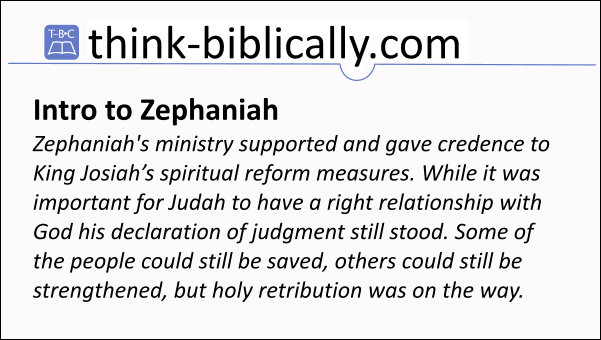By Tyson Thorne

To appreciate Zephaniah's ministry a review of history is helpful. Earlier in the nation of Judah’s life there was a king named Manasseh. He was by far the most evil king to have ruled over Judah, and his reign was longer than any other (55 years). It was during this reign of evil that God gave an irreversible judgment on Judah saying, “I will wipe out Jerusalem as one wipes a dish, wiping it and turning it upside down. I will forsake the remnant of my inheritance and hand them over to their enemies.” 2 Kings 21.2-6 recounts the sins of Manasseh:
He did evil in the sight of the Lord... He rebuilt the high places that his father Hezekiah had destroyed; he set up altars for Baal and made an Asherah pole... He bowed down to all the stars in the sky and worshiped them. He built altars in the Lord’s temple... In the two courtyards of the Lord’s temple he built altars for all the stars in the sky. 6 He passed his son through the fire and practiced divination and omen reading. He set up a ritual pit to conjure up underworld spirits, and appointed magicians to supervise it. He did a great amount of evil in the sight of the Lord, provoking him to anger.
After this time of political instability and national upheaval, Josiah’s reign was a welcome respite. Far more peaceful by comparison, due to the growing threat to Assyria by Babylon. So Israel enjoyed a time of quiet restoration. Josiah took great efforts to restore Israel economically, militarily, and spiritually. God blessed his efforts and his reign, but the judgment from Manasseh’s day was still effectual, and was soon to come upon his people. Josiah died in 609 B.C., four years before Babylon would take over Judah.
Author & Date of Composition
Zephaniah was probably a descendant of King Hezekiah (1.1) who prophesied under his relative King Josiah of Judah. His ministry supported and gave greater credence to King Josiah’s spiritual reform measures. God did state, however, that while it is important for Judah to have a right relationship with YHWH, there was no escaping the punishment that God had already initiated on them as a nation. Some could still be saved, others could still be strengthened, but judgment was on the way. He dates his ministry by Josiah’s reign, putting him somewhere around 635 BC, and making him a contemporary of Habakkuk and Jeremiah.
The Book
- Judgment of Judah, 1.1-2.3
- Judgment of Other Nations, 2.4-.15
- Judgment of Judah, 3.1-.8
- Blessings on All Nations, 3.9-.20
“The Day of the Lord” is an oft used phrase throughout this small book. To be sure, it refers to both the Babylonian invasion and to the end of time when God will impartially judge the nations, but aside from this we know little more. A few things we can discern regarding this day are:
- it is a judgment for sin, 3.7
- it is imminent, 3.8a
- it is a universal judgment, 3.8a
- it is a time of terror, causing convulsions in nature, 3.8b
- only a remnant will survive, 3.8-.13
One thing is sure, just as judgment came upon Judah, so judgment will come upon us. Are we prepared for “The Day of the Lord?”
